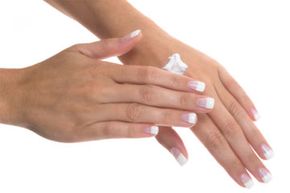Whether you're typing out an e-mail on your computer or cooking a delicious dinner for your family, your hands are in constant contact with other objects. While they're touching papers, doorknobs, handles or food, they are encountering all kinds of germs that the rest of your body typically avoids. To keep yourself healthy and germ-free, you're probably washing your hands several times a day in warm water. While this is a great way to keep the flu away, this daily practice can also lead to dry hands.
Dry skin, also known as xerosis, can cause itchiness, skin irritation, fine lines and wrinkles. Even though it isn't a serious skin condition, you'll probably want to take steps to avoid the often uncomfortable symptoms. Since dry skin is a product of many factors, including the weather, bathing and health conditions, it's very common, and it affects everyone differently [source: Medline Plus]. And as your hands are exposed to the elements more than most parts of your body, taking steps to keep them moisturized is one of the most important steps to preventing dry skin.
Advertisement
People often worry about the appearance of wrinkles on their faces as they age, but what about their hands? Keeping your hands moisturized can avoid signs of aging. In fact, the skin on your hands ages more quickly than the skin on your face. It may sound surprising, but the lack of fat on the back of your hands leaves signs of the breaking down of collagen and elastin more noticeable. A smart hand care routine will also help to keep your hands looking young, in addition to keeping them moisturized [source: Bouchez].
If you've already noticed your hands experiencing some of the symptoms of dry skin, read the next page learn how to treat them.
Advertisement


